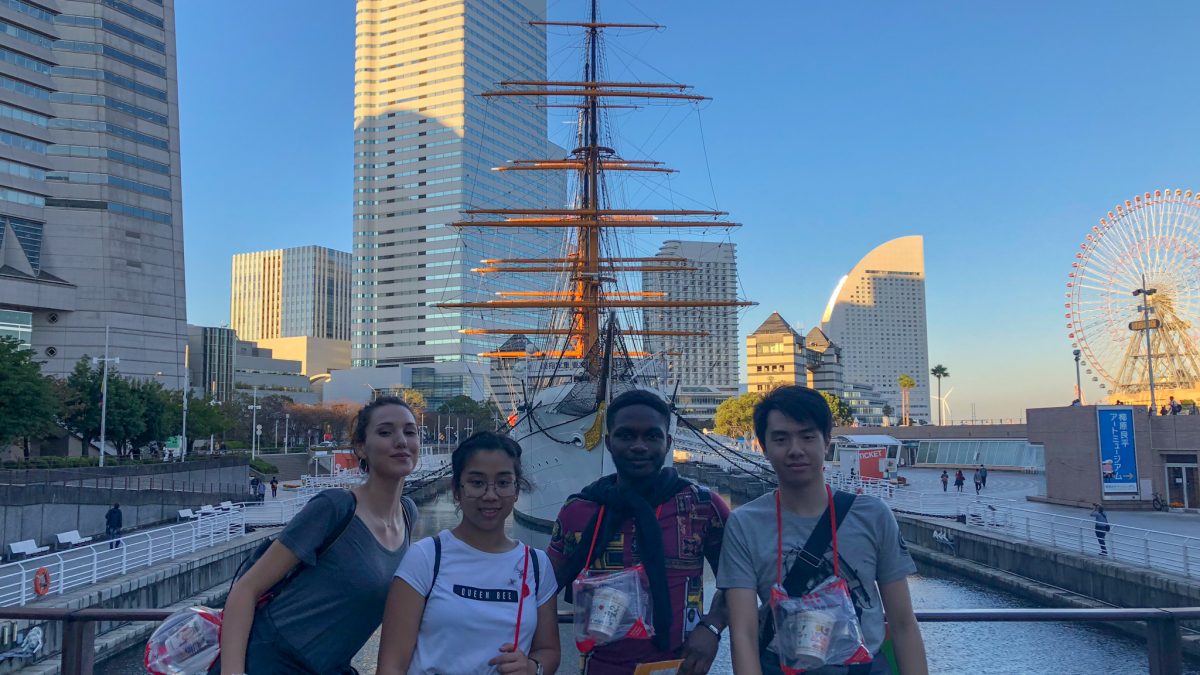What to do when Interning in Japan?
What to do when Interning in Kansai Region or Tokyo in Japan?
If I could do it all again, what would I do differently?
What to do when Interning in Japan? Written by Edlyn Evangelista, Intern Influencer and Tokyo Program alum from the University of South Australia.
Traveling solo is an exciting feat, especially if it’s the first time. So many things running through your mind and a growing list of ‘maybes’ and ‘what ifs’ clouding and possibly cluttering your bag; have I brought that? Have I forgotten to pack this? Did I need to pack that? What if I needed to bring that. Sound familiar? Yeah, it’s a stressful endeavor. I agonized for months trying to figure out what to bring, what to buy, what to leave, what to pack, which clothes to ditch, so on and so forth.
But worry no more! I am here to make your life a little easier with a list of things I would do differently if I were to do my internship in Japan again. So, whether you are a seasoned traveler, or a first timer, I hope that this can help put your mind at ease.
1. Make a list!
But only one list – have headings and categories. This helps. More than you probably know. Keep this list in a safe place. Your phone – a document on Google Drive, iCloud or whichever you feel is best. Update this list whenever you pack something or decide to ditch an item. It would save you your sanity if you have trouble remembering.
I also had a separate category for the essentials recommended by CRCC Asia.
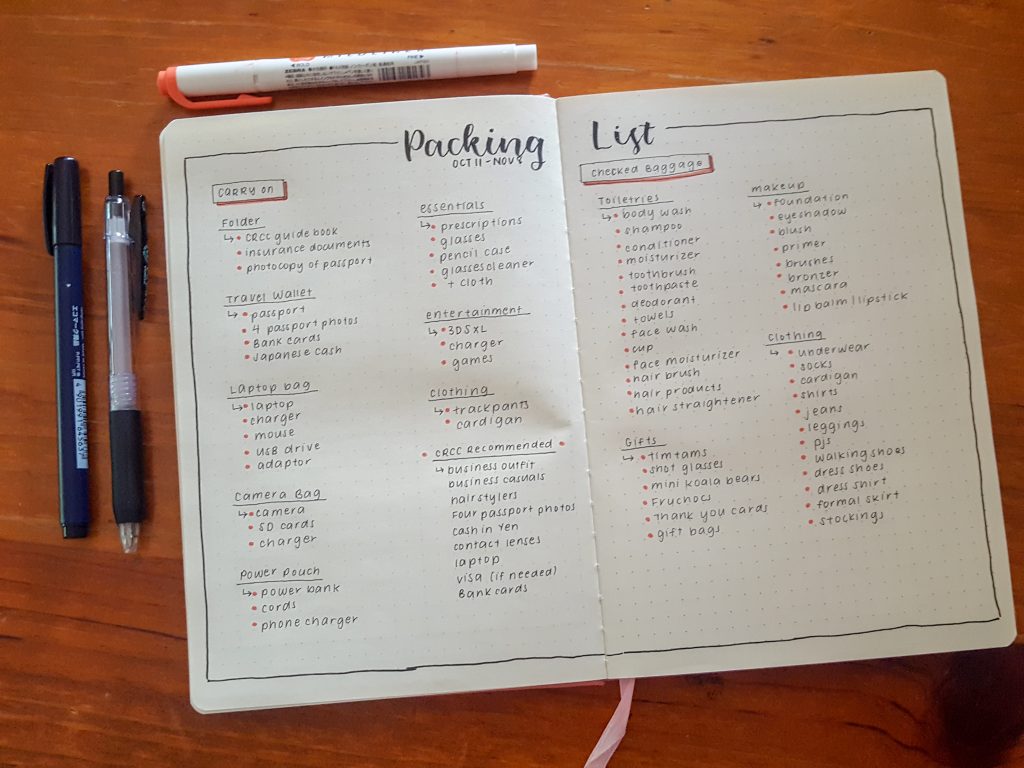
Making a packing list can be a great way to get organized. You can even eliminate things you won’t need if your case is getting too heavy! Photo by Edlyn Evangelista
2. Keep essentials VERY accessible.
On of the most important bits of advice I can give in knowing what to do when interning in Japan is KEEP THINGS ACCESSIBLE. I had a small handbag with me which had some essentials like feminine items, hand sanitizer, passport, tickets, phone and keys to my luggage. My carry-on carried a set of clothing (I wanted to look cute during the day and be comfortable during the flight, okay?) as well as my laptop. I kept my laptop easily accessible so when customs came up, I could slap everything into a container, and go through easily. As a solo traveler, quick and easy access will save you a lot of stress. You don’t want to be stuck in line struggling to get yourself back together when there are literally hundreds of people in line waiting.
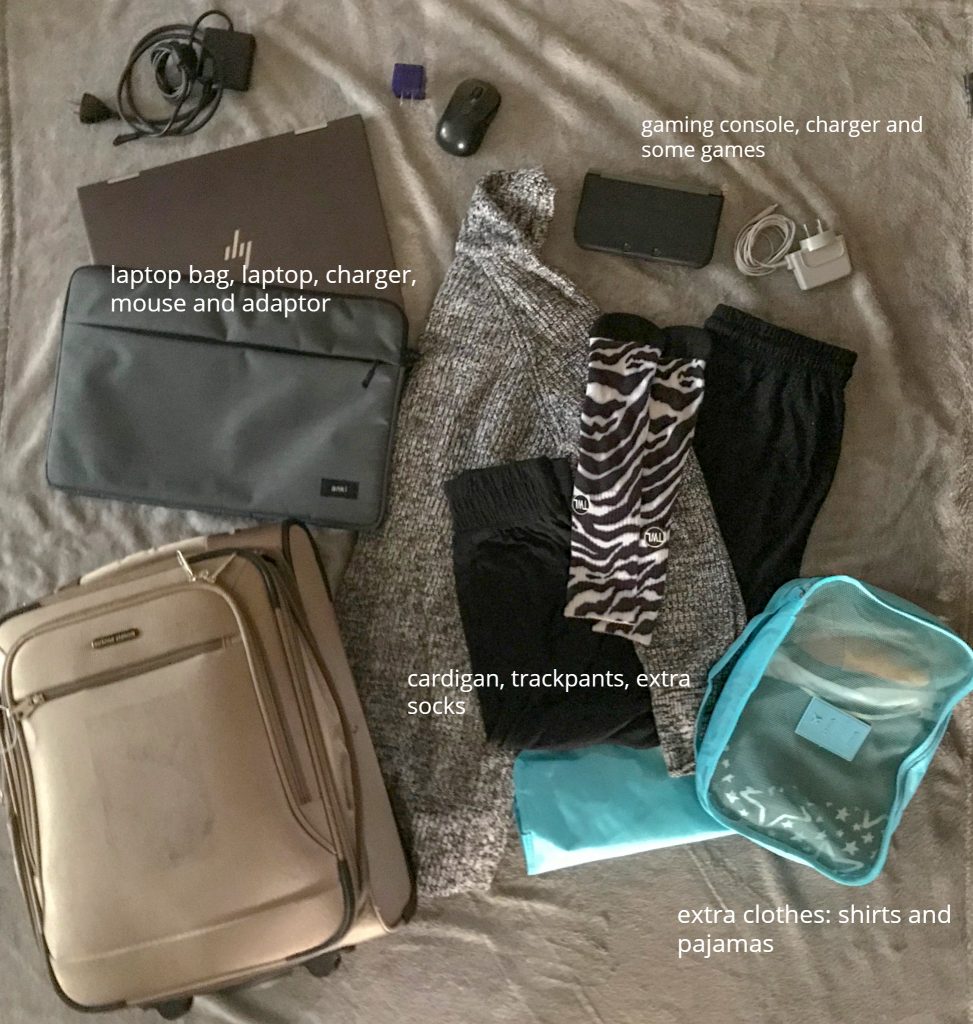
Keep your essentials in a carry-on! It will save queuing time at the airport and you’ll avoid disaster if your luggage gets delayed. Photo by Edlyn Evangelista
3. It’s an internship in Japan. Bring a suit.
I made this mistake because my company was casual – like, very casual. It was basically first name basis straight away. Nevertheless, bring the suit. You can NEVER be overdressed. Save yourself the embarrassment that I faced when I rocked up in casual clothing on the CRCC Asia Induction Day. Everyone else rocked up in formal clothes. The guys had suits on and the only other girl wore something very similar. I, on the other hand, wore a white tee, shorts and a cardigan. It wasn’t that bad, but I was very much underdressed compared to everyone else. Despite the reassurance, forgiving nature and friendliness, it was still a little embarrassing. It honestly looked like I was lost. One of the interns actually revealed during one of our group conversations that he thought I was lost on the first time we all met because of what I was wearing. Save yourself the trouble, bring that suit. You’ll be glad you did.
In case it misinterprets, there were no hard feelings from this mishap. We are all on good terms!
4. Cash, not card.
Despite being known as a futuristic country, Japan is still very much a cash-based society. You will also accumulate coins whether you like it or not. Fret not, you can use 10 yen and above to top up your Pasmo travel card! Even if you spend the 1 yen on snacks or something at the convenience store, it would still save you the trouble to lugging them around. And don’t worry – they won’t mind if you have loads of 1 yen coins, unlike Australia! I recommend doing this because I was not able to exchange leftover coins back into my local dollars. Do you know how many snacks I could have bought with my leftover coins? Neither do I, because I brought those coins back and didn’t find out.
Side note: When exchanging back into local currency after your internship in Japan, do your research. I was foolish enough to exchange back into local dollars from an amazing rate: 79JPY to 1AUD which was basically how much I exchanged from AUD to JPY. It turned out, however, that there was a 16% commission fee. It infuriated me since I missed the note and I lost roughly $100 to commission. Do your research.
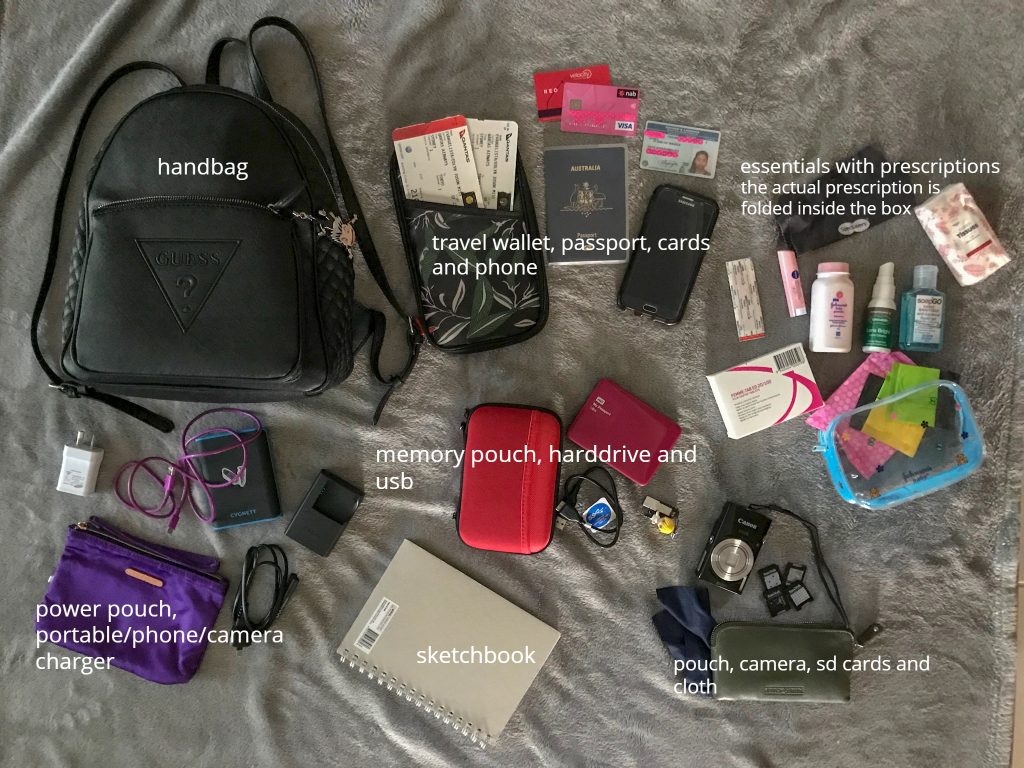
Keep your daily essentials organised so that you’re prepared for your internship in Japan…and travelling on the weekend! Photo by Edlyn Evangelista
5. Try all the food you can.
I kind of stupidly only stuck to what I knew because I feared I would run out of money before the end of my trip even though I ended up with loads of foreign money left over. Try all that you can. Explore different tastes. Try sashimi, sushi (even though you have to seek these out – they aren’t as common as we thought), different flavored drinks, different snacks – there is a whole other world of food. Explore it. It’ll be one of the best things you did.
This was one of the biggest things I would change if I could. If I was to go back, I would try that local ramen restaurant down the street from the accommodation. Or the restaurant next door. I was foolish not to. I chose bento boxes over them. The bento boxes were delicious and great value for money, but I may not ever get to try those restaurants now. Not unless I specifically seek them out when I return (which I will).
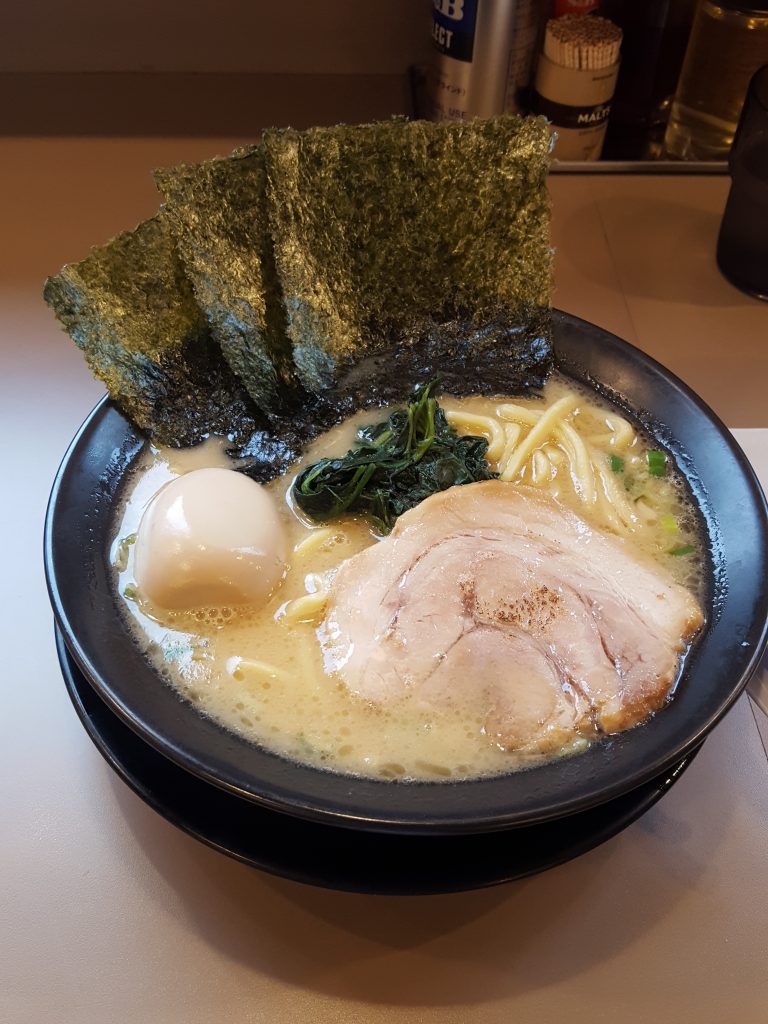
Be adventurous when eating out – you might regret missing out on Japan’s best dishes! Photo by Edlyn Evangelista
6. Learn basic phrases.
People in Tokyo will understand if you don’t know the local language, but it would be respectful to learn some basic phrases. You would also make life a lot easier for all parties involved. It’s not something I would want or need to do since I already studied Japanese for over 2 years before going, but even so, my struggle was considerably less compared to the other interns. I was able to ask questions, get some directions and have a generally more guided experience from asking locals questions.
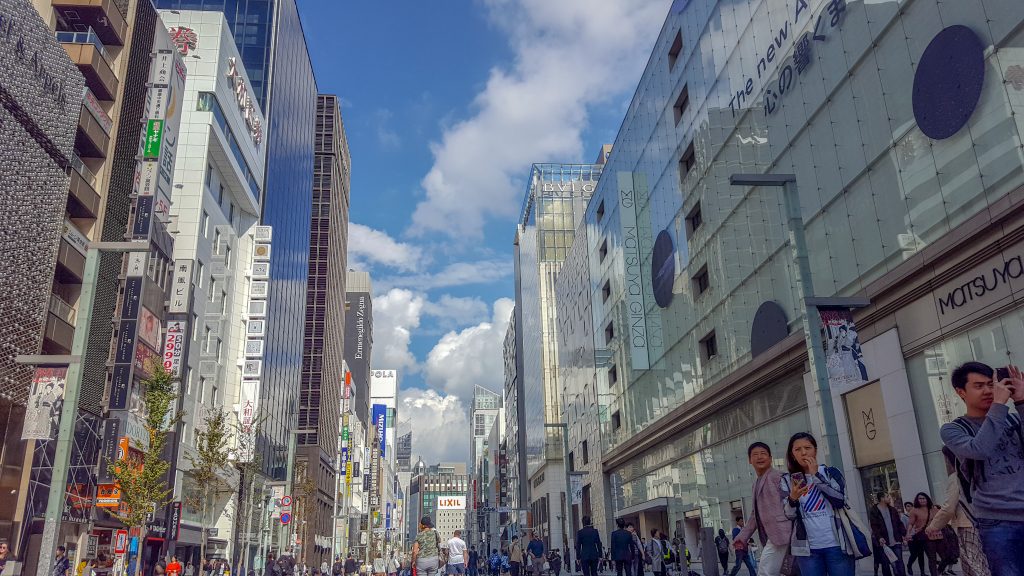
Knowing some basic phrases can help you to get around and get to know your internship colleagues. Photo by Edlyn Evangelista
7. Be aware of a table charge.
One night, on our personal group dinner, we explored the local area and decided on this one yakitori restaurant which I cannot remember the name but it was a downstairs kind of deal. We headed downstairs, and the first conversation went a little like this:
(I’ve translated and contextualized the conversation into English)
‘Table for five, please!’ I told our server confidently.
‘Right this way. Smoking?’ he replied something along those lines.
‘No, thank you, we don’t smoke’, I did not fully understand what he said, but I heard the word for smoking, or tobacco, so I declined politely.
‘Alright, here we are,’
‘Do you have an English menu?’ He did not seem surprised I would ask this question as none of us looked Japanese and he was likely a little more relieved that one of us, at least, were able to converse. He did, however, nod, disappear and reappear a little later with a menu with English translations. I thanked him, and our group hovered around the menu to see what they had. For one reason or another, we did not completely vibe the menu or something else happened but the next conversation with the server went along these lines thanks to my limited experience with conversational Japanese in a non-classroom setting:
‘We have to pay even if we haven’t eaten?’
‘Yes,’ and he said something else but I didn’t fully understand. I couldn’t comprehend getting a charge simply for sitting down. I was confused for more than one reason.
‘I’m sorry, I don’t quite understand. Why do we have to pay? How much is this charge?’
He then explains that this charge, something like 510 yen, was for one person. So all together, we would have had to pay 2550 yen. I still couldn’t grasp the concept. Why would they charge us if we haven’t eaten anything?
‘Is it because we sat down?’
And he nods, almost eagerly, grateful we have come to a mutual understanding. So I nod, and tell him I understand and ask for a little more time so my group and I can decide our next plan of attack. I convey what happened to my friends: There is a table charge, so we have to pay this amount regardless if we eat here or not.
We ended up staying, trying a few different dishes, and playing ‘rock paper scissors’ for the extra pieces and having an absolute blast. We even mistakenly ordered chicken cartilage because it looked like popcorn chicken and I was blissfully unaware of what the word had meant.

When interning in Japan…you never know what you might come across! Photo by Edlyn Evangelista
8. Seek out the cheapest option in the area.
Having a laundry room was convenient for the resident’s use, but having so many people use the same facilities will have its cons. First, there were always clothes hanging in the drying area during the general hours of the day so unless you were early, you weren’t going to be able to use the area. And second, it was expensive to run. The dryers needed to run at least twice to thoroughly dry my loads of clothing (which is one week’s worth of clothes).
So, shout-out to Bod, our fellow intern, for discovering and finding a laundromat that is cheaper to run. It was down the main road heading towards the Tokyo Dome and tucked away in a side street about 7-minute walk from the housing. You still need your own detergent but it is cheaper in both ways: the washes are less expensive and the dryer only needs to be run once. Save your money for things that are worth it like trying out new food.

Saving your money with research and smart choices will help you have change to spare for more fun activities! Photo by Edlyn Evangelista
9. Bring a portable charger and keep it charged.
Last but not least in Edlyn’s opinion on what to do when interning in Japan involves our beloved portable chargers! I went out for a day trip and forgot to charge my phone the previous evening. I thought my portable charger was full, but it wasn’t until I got to my destination for the day that I realized it was on its last bar. This posed a few issues like not being able to update social media on the amazing things I was doing but also more serious things like not being able to contact anyone should things go wrong. I was roughly able to navigate by going back the way I came and the signs had English so it was not an impossible feat. But it would have saved me so much stress if I had just had a fully charged portable charger.
I hope that this list helps in any way, shape or form to reduce the stress you might be facing. If I have forgotten something, leave a comment below. We can help each other out! If you have a question, ask away. The CRCC Asia staff are there to answer any question you may have, too. Formalities aside, the goal is to spend a little more time exploring and having fun, and a little less time stressing and worrying.
We hope that clears things up on what to do when interning in Japan! You can apply online today for an internship in Tokyo or Kansai region! You can also check out other blogs from our Tokyo Program alumni.
What to do when interning in Japan written by Edlyn.

